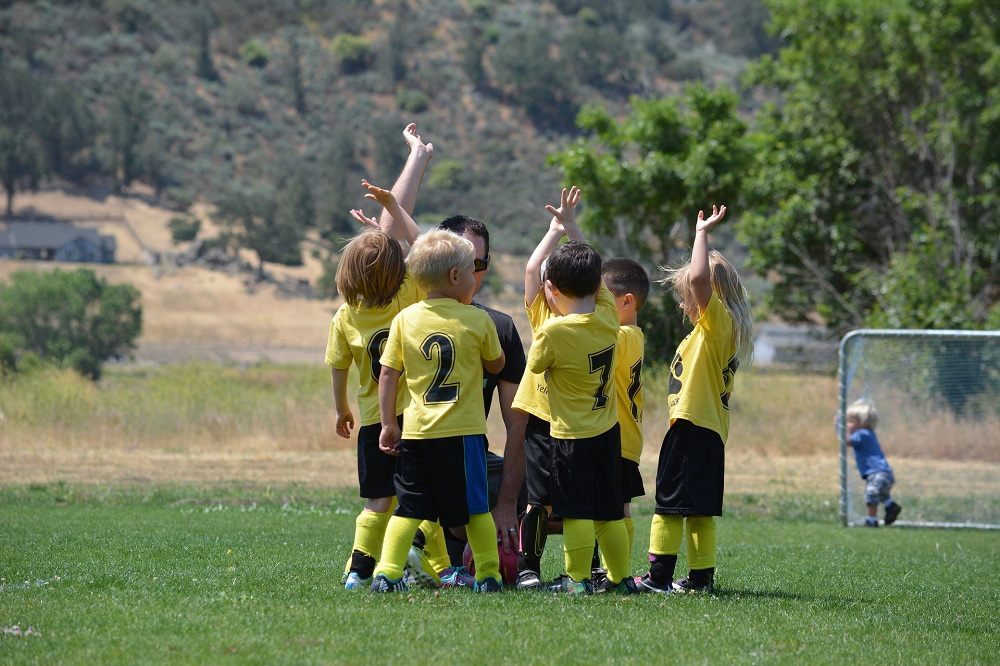It is a known fact that being physically active through exercise and sports is important for kids. Playing sports can provide children more than just physical fitness. Studies have shown that being athletically inclined can influence better psychological and social wellness for the young ones.
Parents are often hesitant to allow their children to play sports because of the possibilities of their kids getting physical injuries. However, playing sports is an excellent activity that will provide children plenty of benefits that are essential to them in their formative years. Joining in athletic activities could improve their social skills, build self-esteem and confidence, and encourage them to be become competent individuals. Participation can also help children develop the value of goal-setting and practice.
Here are some benefits your children can enjoy when they play sports:
1. Playing sports provides regular physical activity.
This must be the most apparent benefit of sports for children. In the digital age, kids are more inclined to have their eyes glued to gadget screens, may it be by watching television, or playing video games in cell phones or tablets. Getting them to be interested in sports will give them opportunities to exercise and stay in shape.
Playing sports will also help you children enhance their locomotor skills. Being exposed to sporting games can improve their fundamental movement skills including body coordination, balance, muscle strength, speed, and agility.
2. Playing sports develops patience and dedication.
 No one is born perfect at anything. Being good at something demands consistent practice and commitment. Teach your children that if they want to excel in a certain sport, it will require lots of practice. It will help them understand that if you put time and effort into getting better at something, they will get good results. This will teach them the virtue of patience and dedication when it comes to reaching their goals.
No one is born perfect at anything. Being good at something demands consistent practice and commitment. Teach your children that if they want to excel in a certain sport, it will require lots of practice. It will help them understand that if you put time and effort into getting better at something, they will get good results. This will teach them the virtue of patience and dedication when it comes to reaching their goals.
The discipline of training and commitment to excellence is a trait that can be applied to many other aspects of life. That’s why it’s no surprise that people who are inclined to sports also perform well academically. This is because athletes often implement the same principles of dedication and hard work they learned from sports when it comes to their studies.
3. Playing sports builds teamwork.
The ability to work well with other people is a skill that kids can learn by playing sports. Being part of a sports team requires its players to cooperate to achieve a common goal. It’s easy to learn that being able to collaborate with one another is a very important part of being with a team, and not being united as a group is a crucial part of winning.
By getting exposed to group dynamic activities during their early years, they can develop a good sense of teamwork that they can bring with them through their entire lives. This is especially advantageous when they have to work in a group for school projects or in their future jobs. Good teamwork means better productivity and more harmonious relationship among the group members.
4. Playing sports teaches leadership skills.
 Aside from teamwork, another skill that can be developed through playing sports is leadership. By being in teams, children are taught a sense of responsibility when they get assigned to vital roles for the game. Aside from this, they also learn how to care for their teammates as they develop stronger relationships with every game.
Aside from teamwork, another skill that can be developed through playing sports is leadership. By being in teams, children are taught a sense of responsibility when they get assigned to vital roles for the game. Aside from this, they also learn how to care for their teammates as they develop stronger relationships with every game.
Leadership does not always mean being in command. Sometimes, it’s about being accountable for your actions and responsibilities expected for your role, setting you as a good example for sportsmanship.
5. Playing sports teaches respect.
Generally, sports are governed by rules and is competitive by nature. Playing team sports helps children learn the value of respect in many ways.
First, they learn how to respect their coach. Having a coach help them understand how to treat instructors, leaders, teachers, trainers, and other educators with utmost respect. Next, they also learn how to honor rules and authorities. At a young age, it is important for children to understand the consequences of disobeying rules, and how to respect the people who administer them. Lastly, sports also teach children how to respect their opponent. Often times, competitiveness get the best of people. But it is important to learn how to stay grounded and understand that there will always be winners and losers in every game.
6. Playing sports enhances mental health and well-being.
 When it comes to self-esteem and confidence, even the simplest gestures make a great impact. A simple pat on the back, a thumbs up, or applauding can boost a child’s morale. When engaging in competitive activities such as sports, they can get praises, compliments, and encouragements from coaches, parents, and friends that allow them to build self-confidence.
When it comes to self-esteem and confidence, even the simplest gestures make a great impact. A simple pat on the back, a thumbs up, or applauding can boost a child’s morale. When engaging in competitive activities such as sports, they can get praises, compliments, and encouragements from coaches, parents, and friends that allow them to build self-confidence.
Children also develop self-confidence when they get to know themselves better. Being exposed to training sessions and practices also helps them get to know more about their own abilities and strengths. Receiving constructive criticisms are also a big part of being an athlete. Getting these criticisms from their coach allows them to understand how to work on their weaknesses and use them to their advantage. Studies also show that young athletes are more open to feedback when they grow up.
7. Playing sports reduces risks of childhood obesity.
These days, children are more vulnerable to obesity because they are more inclined to fast foods than healthy dishes. Aside from this, the digital age has drawn children to be more into video games than physical activities. Studies have shown that nearly one out of three children and adolescents between the ages of 2 and 19 are either overweight or obese.
The key to prevent your children from becoming obese or overweight is to make sure they are regularly exercising. Sports play an important role in weight control. Participating in sports is a good way to ensure that your kids engage in physical activities on a regular basis, helping them maintain a healthy weight.
8. Playing sports instills better social skills and stronger relationships.
 Participation in sporting activities can help your child enhance their social skills that they can use for the rest of their lives. Through athletic activities, they get to interact with different people from their teammates, opponents, coaches, sports officials, and more. Kids can learn communication skills from sports that they can apply in school, their future career, and personal relationships.
Participation in sporting activities can help your child enhance their social skills that they can use for the rest of their lives. Through athletic activities, they get to interact with different people from their teammates, opponents, coaches, sports officials, and more. Kids can learn communication skills from sports that they can apply in school, their future career, and personal relationships.
With the social development children obtain from their games, they learn how to handle themselves well in various social situations. They can improve on ways to manage crisis, resolving conflict, and more. Playing sports will also allow your children to build friendships that are founded by common interests. They also grow a sense of fraternity and support that makes them better in maintaining and nurturing their relationships with other people.
These are just some of the many reasons you should expose your children to sports. Aside from all these benefits, it all boils down to giving your child more opportunities to get to know themselves and their interests while taking into consideration their overall development on their early years. So gather the family, grab your banners, and cheer on your young athlete!


